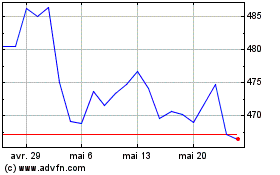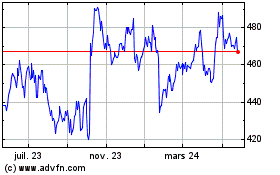By Doug Cameron, Andrew Tangel and Paul Sonne
Donald Trump's battle to curb overspending on defense by
publicly shaming specific companies and projects could prove
tougher for him if he turns attention to one of the fastest-growing
areas of the military budget -- classified programs.
Those are often the riskiest and most complex projects pursued
by the Pentagon because of their use of cutting-edge technology
that makes them more prone to delays and cost overruns. They also
are the most-difficult to discuss publicly.
The incoming commander-in-chief will be privy to the progress of
secret programs ranging from new nuclear missiles to spy satellites
and cyberdefenses, so he would have the ammunition to call out
problematic or wasteful programs publicly. That would contrast with
previous presidents who have kept any such problems firmly under
wraps.
Even before his inauguration next month, Mr. Trump has taken the
defense establishment to task. This week he fired a public salvo at
cost overruns and delays afflicting the F-35 combat jet, the
Pentagon's costliest program by far and the subject of years of
criticism from lawmakers and budget watchdogs.
But Mr. Trump doesn't have the same latitude in disclosing
details regarding classified program costs. "It's virtually
impossible to have any kind of public debate," said Todd Harrison,
a defense budget expert at the Center for Strategic &
International Studies.
A spokesman for Mr. Trump didn't respond to a request for
comment.
Classified programs are estimated to consume $62.2 billion, or
11%, of the 2017 Pentagon budget. That compares with 9% of the
budget five years ago. And such programs' share of the military
spending is expected to continue rising. Indeed, Mr. Trump's push
against the Islamic State extremist group is expected to boost
funding for the intelligence agencies, and he has supported a
revamp of U.S. nuclear forces set to start soon at an estimated
cost of $500 billion. Large parts of both fall squarely into
classified budgets.
For now, most of the Pentagon's efforts to replace the nuclear
triad of submarines, land-based missiles and the B-21 bomber over
the next decade will remain under wraps, beyond its announcement of
contract awards.
Yet those and other classified projects undergo far less
scrutiny from lawmakers over the cost and performance than regular
weapons. That situation isn't expected to change under Mr. Trump
and the Republican-controlled Congress.
Mr. Trump could opt to break with convention and highlight what
he sees as problematic secret programs by declassifying them. "As a
general matter, the president has the unilateral power to
declassify classified materials and to read anyone he chooses into
a classified program," a former White House official said. That
view is shared by other legal experts.
But doing so could reveal top military secrets to U.S.
adversaries, Mr. Harrison said: "There would be severe national
security implications in some cases."
When it comes to classified projects, the outside world would be
largely reliant on whistleblowers, leaks or Mr. Trump for an
inkling of what is going on. Doug Berenson, at defense consultant
Avascent, said the relative value for money of classified projects
can only be guessed at by outsiders.
Lawmakers and budget watchdogs have long wrestled with oversight
of a parade of programs, including the new Air Force bomber known
as the B-21 Raider being developed by Northrop Grumman Corp.
The lack of disclosure around the B-21 already has attracted
congressional criticism. Sen. John McCain (R., Ariz.), Chairman of
the Senate Armed Services Committee and a longtime critic of some
big Pentagon programs has warned that the $100 billion bomber
program could become the next F-35 with regard to cost
overruns.
The B-21, for example, doesn't appear in the annual assessment
of big weapons programs published by the Government Accountability
Office, a congressional watchdog.
The Air Force has pledged to release more information, but
hasn't disclosed how much it is paying Northrop for the B-21s in
total, just the development cost and an average price of $511
million for each across the life of the program. And that amount
would change depending on how many the government buys.
And defense contractors provide scant detail of their classified
work in their announcements or in public filings, making it tougher
for investors in such companies to assess profitability or whether
programs are going awry.
B-21 maker Northrop Grumman, which like others relies heavily on
defense contracts, gives only annual updates on its order backlog
rather than quarterly briefings. Pratt & Whitney, the United
Technologies Corp. unit providing the bomber's engines, won't say
where it would make them. Other subcontractors such as Rockwell
Collins Inc. have acknowledged they are working on the B-21, but
stop there.
The defense contractors declined to comment, though executives
have said classified programs generally don't attract higher
margins than other work, though there are greater barriers to
entry.
Some experts said Mr. Trump's offensive against defense
companies could help the Pentagon's own efforts to improve
efficiency, even if he were to keep details spare on classified
programs. "I can see a President Trump providing top cover...to
hold contractors' feet to the fire," Avascent's Mr. Berensen
said.
Write to Doug Cameron at doug.cameron@wsj.com, Andrew Tangel at
Andrew.Tangel@wsj.com and Paul Sonne at paul.sonne@wsj.com
(END) Dow Jones Newswires
December 14, 2016 14:54 ET (19:54 GMT)
Copyright (c) 2016 Dow Jones & Company, Inc.
Northrop Grumman (NYSE:NOC)
Graphique Historique de l'Action
De Juin 2024 à Juil 2024

Northrop Grumman (NYSE:NOC)
Graphique Historique de l'Action
De Juil 2023 à Juil 2024
